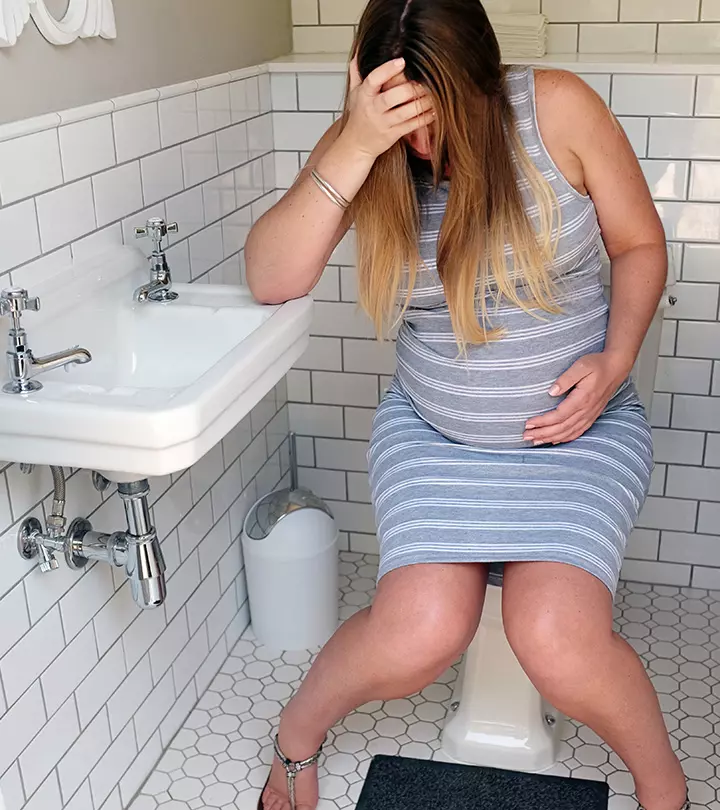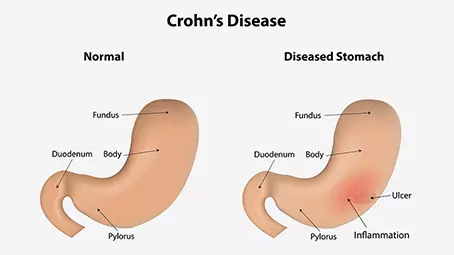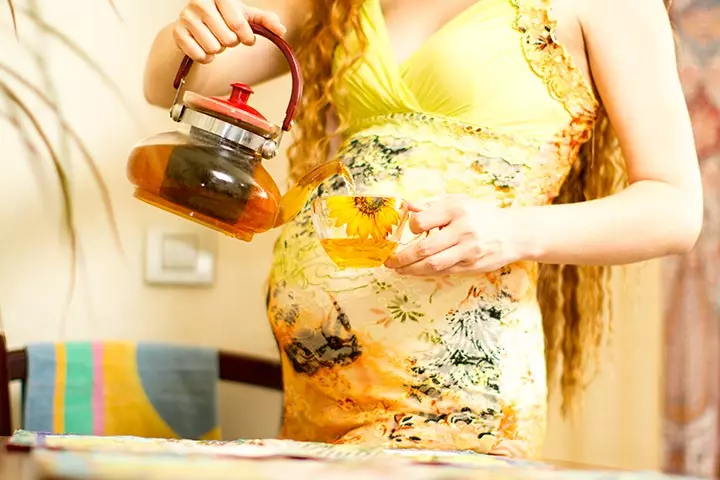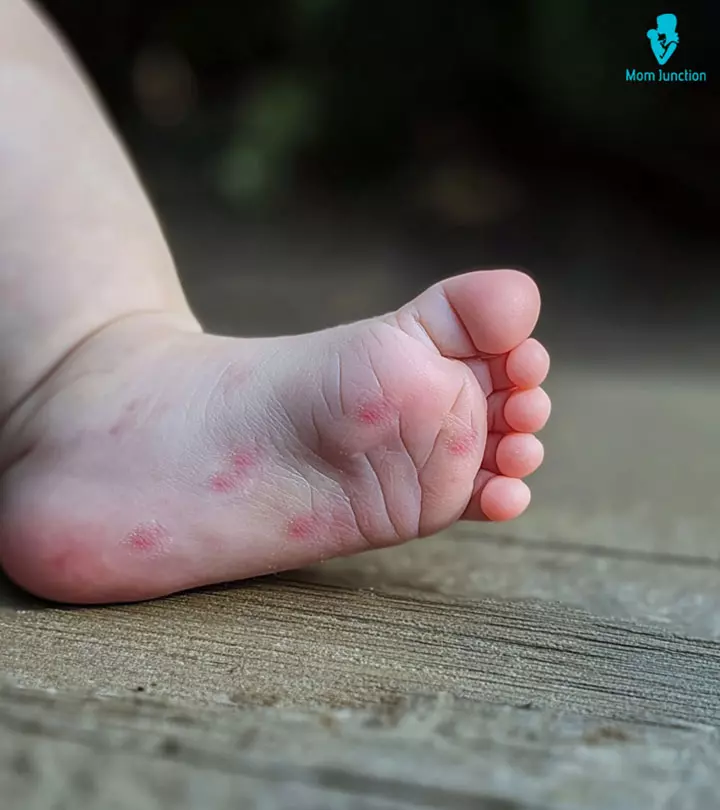
Image: iStock
Excess mucus in stool during pregnancy may occur due to gastrointestinal issues or pregnancy-related factors, such as hormonal changes that affect the digestive system. Gastric mucus is produced in the stomach and helps in the motility of the digested food in the gastrointestinal tract. We excrete some mucus in stools usually. However, pregnancy may increase the amount of mucus excreted, making it more noticeable (1).
Excess mucus due to underlying issues is treatable. Read this post to learn the various causes and treatment options for excess mucus in stool during pregnancy.
Key Pointers
- Pregnant women may pass mucus in their stool during the first trimester due to dehydration, hormonal changes, stomach infections, and other issues.
- Some treatment options that may relieve the condition are proper hydration, a healthy diet, mild exercises, and avoiding allergic foods.
- Consult a doctor if you notice excess mucus, pus, or blood in the stool or experience pain, cramps, or bloating.
Is It Normal To Have Mucus In Stool During Pregnancy?
Experiencing mucus in stool during pregnancy is not uncommon and can be attributed to a range of gastrointestinal issues (2) (3). that often go unnoticed. Particularly in the first trimester, when significant bodily changes occur, the chances of passing excess mucus in the stool are heightened. However, it’s crucial to remain vigilant and seek medical advice if you observe an excessive amount of mucus accompanied by pain and bleeding. You may consult an obstetrics and gynecology specialist to help determine the cause of the condition.
What Causes Mucus in Stool During Pregnancy?
Some possible causes of secretion of excess mucus in stool during pregnancy are (3) (4) (5) (6):
- Dehydration: Hydration is for a healthy gut and mind. During pregnancy, water intake is crucial for the mother and her fetus. Dehydration might be one of the prime factors for the excretion of mucus in the stool.
- Irritable bowel syndrome: Change in routine, stress, and infection may cause irritable bowel syndromeiA disorder of the digestive system leading to recurrent gas, pain, diarrhea, and bowel issues IBS during pregnancy. The symptoms may include mucus in stool, abdominal discomfort or pain, and alternating diarrhea and constipation.
- Hormonal change: Various hormonal changes occur in your body during the gestational period. Some pregnancy-specific hormones may directly or indirectly regulate the mucus secretion in the stool during pregnancy. For example, hormones like progesterone can relax the gastrointestinal tract, which may increase mucus production and affect digestion.
- Infection in the stomach: Bacterial or viral infection in the intestinal tract may result in excess mucus secretion in the stool. Intestinal parasites such as tapeworms, hookworms, amoeba, and pinworms could be the reasons.
Some symptoms of stomach infection that may accompany the secretion of mucus in the stool are diarrhea, cramping, vomiting, nausea, and fever

Image: IStock
 Quick fact
Quick fact- Food allergies: Lactose intoleranceiA condition in which the body is unable to digest lactose sugar, resulting in digestive problems and specific food allergies may also result in mucus secretion in the stool.
- Intestine blockage: The fetus might be pushing against the intestine wall, resulting in blocked intestine and constipation during pregnancy. The body might be over secreting mucus in the stool to ease constipation.
- Medications or vitamins: Prenatal intake of vitamins fortified with iron or calcium during pregnancy may be associated with excess mucus excretion in stool.

Image: Shutterstock
- Hemorrhoids: Piles or hemorrhoids are swollen veins around the anus usually accompanied by constipation during pregnancy. During pregnancy, hemorrhoids may occur due to constipation and pressure from the growing baby.
 Quick tip
Quick tip- Other gastrointestinal conditions: These include Crohn’s diseaseiA chronic, inflammatory gastrointestinal condition causing severe digestive symptoms , ulcerative colitisiA chronic condition that results in swelling and ulcers of the colon and rectum , colon polypsiSmall, benign growth of tissues in the mucosal lining of the colon (large intestine) or rectum , and diverticulitisiA disease wherein tiny sacs protrude inside the walls of the colon, causing inflammation and bleeding .
What Are The Treatment Options And Ways To Prevent Mucus In Stool?
Identifying the cause behind mucus secretion is essential for the treatment. Some treatments options available for reducing mucus in the stool during pregnancy are (7) (8) (9):
- Stay hydrated: Taking plenty of water during pregnancy may help reduce dehydration-induced constipation. It can also avoid the accumulation of various toxins in the body. The American College of Obstetricians and Gynecologists (ACOG) recommends drinking around 8 to 12 cups (64 to 96 ounces) of water every day. Excess fluids, including more fresh juices in your diet, are beneficial. Water also helps absorb water-soluble vitamins (vitamins B and C) from the diet into the body.

Image: IStock
- Take a healthy diet: A healthy and balanced diet rich in green leafy vegetables and fiber supplements can help reduce constipation during pregnancy.
- Change medication: If you have mucus secretion in the stool followed by vitamin intake, you may consult your physician. It might be possible to change the particular medication to help you relieve mucus in the stool.
- Use laxatives: In constipation, your health care provider may suggest a laxative or a stool softener. The laxatives are over-the-counter medication and may help reduce constipation and mucus secretion in the stool.
 Health fact
Health fact- Get the infection cured: If the origin of mucus in the stool is an infection, your doctor may suggest an antibiotic regime to control the infection. It is best practice to complete the course of antibiotics for complete recovery and reduce recurrence.
- Avoid allergic food: In case of food allergies, try to identify and avoid the allergen in your food. Abstaining from the source of allergy may help regain a healthy gut and reduce mucus secretion in the stool. It is always good to limit junk and spicy foods for better health during pregnancy.
 Did you know?
Did you know?- Include mild exercises: Exercising during pregnancy can help you stay healthy and fresh. A little warm up followed by movement exercise will keep your gut healthy. It may help ease constipation-induced mucus secretion. Mild exercises and physical activities are safe during the pregnancy. Walking and jogging may keep you active and aid digestion.
- Manage stress: Practicing relaxation techniques such as yoga, meditation, or deep breathing can help ease gastrointestinal symptoms during pregnancy.

Image: IStock
When Should You Call The Doctor?

Image: Shutterstock
Mucus in stool is not a sign to worry about. You may improve your lifestyle and undertake preliminary measures to reduce the excess secretion of mucus in stool.
When stool has an excess amount of visible mucus during pregnancy, it may be due to health conditions, such as (10) (11) :
- Irritable bowel syndrome
- Ulcerative colitis
- Crohn’s disease
One may take note of the symptoms and consult a doctor in the following cases:
- There is an excess amount of mucus in the stool
- Blood or pus in the stool
- Pain while passing stool
- Having stomach pain, cramping, or bloating
- Sudden changes in stool frequency, consistency, or color
Frequently Asked Questions
1. Can probiotics cause mucus in stool?
Research indicates that probiotics may alter the composition and volume of stool, causing gassiness and increased mucus secretion in stools. If you notice these symptoms after consuming probiotics during pregnancy, you should talk to your gynecologist or nutritionist (16).
2. Can anxiety cause mucus in stool?
Anxiety may increase mucus secretion in stool in some individuals (13). However, the underlying reason is not known, and it may not happen to everyone.
3. Can mucus in stool during pregnancy be a sign of preterm labor?
The mucus in the stool during pregnancy is not linked to preterm labor. However, if you have any concerns or are experiencing other symptoms, you must consult your doctor for diagnosis and treatment (17).
4. Does mucus in the stool during pregnancy affect the baby’s health?
Dr. Kubanych Takyrbashev, a doctor of internal medicine and anesthesiology from Minneapolis, Minnesota, says, “Mucus in the stool usually doesn’t harm the baby’s health. However, if you experience other symptoms such as blood in the stool, severe abdominal pain, or changes in bowel habits, it is important to consult your healthcare provider to ensure your and your baby’s safety.”
Mucus in stool during pregnancy is usually normal. It may happen due to dehydration, hormonal changes, or food allergies. Understanding your body and making lifestyle changes such as drinking more water, avoiding allergic food, or eating healthy helps keep the problems at bay. However, do not ignore symptoms like pain when passing stool or the presence of pus or blood in stool during pregnancy, as these may indicate more serious conditions such as irritable bowel syndrome or Crohn’s disease. In such cases, it is necessary to consult a doctor.
Infographic: Risk Factors And Evaluation Of Mucus In Stool While Pregnant
Although passing minute amounts of mucus in stool may be normal during pregnancy, certain factors increase the quantity of mucus in stools and the risk of other gastric problems. Here is an infographic with the possible risk factors and diagnostic tests for this condition during pregnancy. Illustration: Momjunction Design Team
Illustration: Mucus In Stool During Pregnancy: Causes And Treatment

Image: Dalle E/MomJunction Design Team
References
- The gastrointestinal mucus system in health and disease.
https://www.ncbi.nlm.nih.gov/pmc/articles/PMC3758667/ - Gastrointestinal Infections in Pregnancy.
https://patient.info/doctor/listeriosis - Bladder and bowel problems during pregnancy.
https://www.pregnancybirthbaby.org.au/common-pregnancy-problems - Hormones in pregnancy.
https://www.ncbi.nlm.nih.gov/pmc/articles/PMC3640235/ - Piles in pregnancy.
https://www.nhs.uk/pregnancy/related-conditions/common-symptoms/piles/ - Irritable bowel syndrome (IBS).
https://www.betterhealth.vic.gov.au/health/conditionsandtreatments/irritable-bowel-syndrome-ibs - Nutrition Column An Update on Water Needs during Pregnancy and Beyond.
https://www.ncbi.nlm.nih.gov/pmc/articles/PMC1595116/ - How much water should I drink during pregnancy?
https://www.acog.org/womens-health/experts-and-stories/ask-acog/how-much-water-should-i-drink-during-pregnancy - Constipation in Pregnancy.
https://americanpregnancy.org/healthy-pregnancy/pregnancy-health-wellness/constipation-during-pregnancy/ - The Diagnosis and Treatment of Crohn’s Disease and Ulcerative Colitis.
https://www.ncbi.nlm.nih.gov/pmc/articles/PMC2695363/ - The Effect of Phloroglucinol in Patients With Diarrhea-predominant Irritable Bowel Syndrome: A Randomized, Double-blind, Placebo-controlled Trial.
https://www.jnmjournal.org/journal/view.html?uid=1563&vmd=Full& - About Giardia.
https://www.cdc.gov/giardia/about/?CDC_AAref_Val=https://www.cdc.gov/parasites/giardia/general-info.html - Piles in pregnancy.
https://www.nhs.uk/pregnancy/related-conditions/common-symptoms/piles/ - Laxatives During Pregnancy.
https://americanpregnancy.org/healthy-pregnancy/is-it-safe/laxatives-during-pregnancy/#:~:text=One%20mild%20laxative%2C%20considered%20to - Stephanie M. Moleski et al.; Increased rates of pregnancy complications in women with celiac disease.
https://www.ncbi.nlm.nih.gov/pmc/articles/PMC4367213/ - Ki-Bae Hong, et. al,; (2019); Effects of probiotic supplementation on post-infectious irritable bowel syndrome in rodent model.
https://www.ncbi.nlm.nih.gov/pmc/articles/PMC6668102/ - Am I in labor?
https://medlineplus.gov/ency/patientinstructions/000508.htm
Community Experiences
Join the conversation and become a part of our nurturing community! Share your stories, experiences, and insights to connect with fellow parents.
Read full bio of Dr. Miguel Angel Razo Osorio
- Dr. Kubanych Takyrbashev holds a medical degree and a masters’ in anesthesiology, critical care, public health, ob/gyn, and integrative medicine from the US, UK, and Russia.
 Dr. Kubanych Takyrbashev holds a medical degree and a masters’ in anesthesiology, critical care, public health, ob/gyn, and integrative medicine from the US, UK, and Russia.
Dr. Kubanych Takyrbashev holds a medical degree and a masters’ in anesthesiology, critical care, public health, ob/gyn, and integrative medicine from the US, UK, and Russia.
Read full bio of Anshuman Mohapatra
Read full bio of Rebecca Malachi
Read full bio of Dr. Joyani Das





















